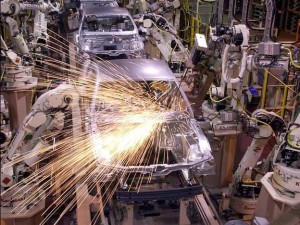Nearly one-fifth of North American car and truck production originated in Mexico during the first half of 2011, according to industry production statistics — more than from our neighbor to the North, Canada.
And lest the UAW and its supporters get their drawers twisted, this South-of-the-Border vehicle assembly is not just by Detroit-based manufacturers fleeing U.S. labor costs. High-volume European and Asian manufacturers also depend heavily on Mexican production, though in some cases it is a base for distribution throughout the hemisphere. Besides cost, high quality work by well-trained and motivated Mexican employees is another driver. For example, Ford’s Hermosillo plant produces the Ford Fusion and Lincoln MKZ, both lauded by independent studies for their high quality.
Therefore, dangerous instability in Mexico poses a threat to the retail market in the U.S. and, indeed, Canada. And this has nothing to do with the paranoia in some quarters about illegal immigrants from Latin America. Indeed, if anything, Mexican production of cars, trucks and parts for the U.S. is the best safety valve we have for immigration problems. The more good jobs there are in Mexico, the fewer Mexicans will want to cross our border illegally to provide for their families.
What are these threats? In short, drug smuggling-related, anti-government violent crimes that are reaching a point just short of outright insurrection.
Following are some examples from a recent privately circulated report:
- In Michoacan state, west of Mexico City on the Pacific coast, but alarmingly close to vehicle production centers near the capitol, on July 13 a drug-trafficking cartel organized a giant public demonstration supporting the cartel and protesting the presence of federal security forces. Businesses and news media were told to support the protests or suffer the consequences. Can you imagine Al Capone organizing a huge public protest against the Treasury Department (which bagged him for tax evasion) in Chicago, or the Mafia coming out from behind its reputed Black Hand to publicly intimidate New York police?
- In Tamaulipas state along the Gulf of Mexico north of Mexico City, through which pass major highway and rail routes, there have been two giant federal prison jailbreaks in the last seven
months: 151 escapees in December and 59 on July 15. In the US, such huge escapes would have resulted in demands to call out the National Guard. - In Durango state, in north central Mexico, a year ago, imprisoned cartel assassins left the prison in street clothes, driving official vehicles and armed with prison guards’ weapons. After killing 17 people at a birthday party, the gunmen returned to the prison, gave weapons back to the guards and re-entered their cells. Anywhere in the world, this activity would be beyond belief, but it seems to have been business as usual in Mexico.
If things like this were taking place in the states of Oregon, Alabama or Ohio, the United States and Western Europe alike would be in an uproar. The public and politicians from all spectrums would forget about perceived threats from Muslim radicals and demand a wholesale overhaul of law enforcement in particular and government in general. We can only sympathize with the law-abiding citizens of our neighbor country.
So how does this threaten vehicle supply for the American market? Consider some of the automotive products sourced from Mexico: Chrysler/Fiat’s Journey, Ram and Fiat 500; Ford’s Fiesta, Fusion and Lincoln MKZ; GM’s Cadillac Escalade EXT and SRX, Chevrolet’s Aveo, HHR and Avalanche, and GMC’s Sierra; Honda, some CR-V, perhaps just for the Latin market; Nissan’s Sentra, Versa and pickup chassis; the bulk of Toyota’s Tacoma, and VW’s Jetta and second-generation Beetle.
Delivery of any of these models could be seriously affected should Mexican gangsters, for instance, interrupt rail shipments in order to gain leverage over the central government. Remember how, just a few months ago, hurricane damage to Mexican railroads upset introduction of Ford’s Fiesta?
Or suppose, like Marxist guerillas elsewhere in Latin America, Mexican drug cartels undertook murders and kidnappings of auto company officials or their family members. This is not so far-fetched. In 1970s Argentina, Marxist guerillas kidnapped a Ford executive. In Panama a few years ago, FARC guerillas made the mistake of kidnapping a Panamanian business man for ransom; unfortunately for the criminals, the victim was a U.S. citizen, and he was rescued, according to Panama sources, by the F.B.I.
While makers and suppliers have tried to stay out of the spotlight, many have reduced the number of Americans and Europeans assigned to work or travel to their Mexican facilities for fear of such problems.
But beyond that, what are the automakers—especially those most likely to be harmed, Ford, Nissan and VW–doing about all this? Do they have contingency plans? It used to be that multiple sourcing avoided localized shutdown (largely because of labor unrest), but that strategy has disappeared in the face of cost-cutting.
And what of the U.S. State Department—is it even aware of the threat to vehicle sales and thus American economic welfare? And, given the strong resentments, especially in Mexico, of long-ago U.S. interventions south of the border, is there anything the U.S. can do to fight cartel crime and help maintain governmental integrity in our neighbor?
Some critics argue that drug-trading cartels and their associated crime waves would go away if the U.S. drastically reduced demand for illegal drugs—as if that hasn’t been national policy for nearly a century. Better yet. Others maintain that if the U.S. merely legalized mind-altering drugs, like ending Prohibition of alcoholic beverages in 1933, Mexico’s problems would be solved.
Neither is likely to happen in the foreseeable future. Meanwhile, Mexico festers. Can auto companies develop alternate strategies to avoid or alleviate worst-case scenarios of criminal supply interdictions?

